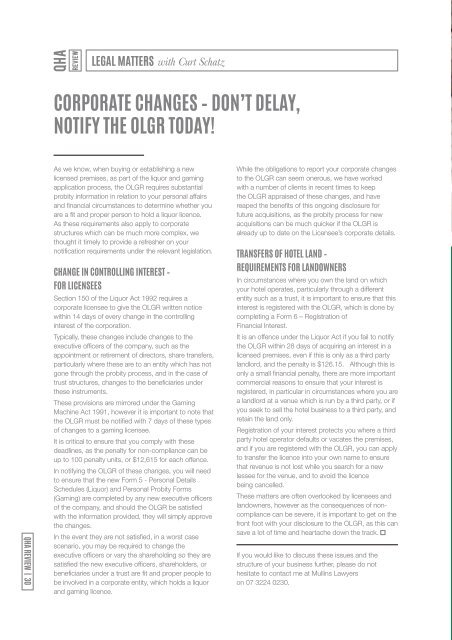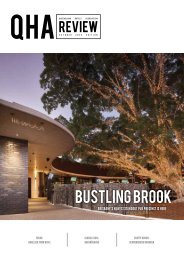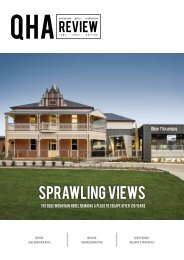QHA November 2017
Create successful ePaper yourself
Turn your PDF publications into a flip-book with our unique Google optimized e-Paper software.
LEGAL MATTERS with Curt Schatz<br />
CORPORATE CHANGES – DON’T DELAY,<br />
NOTIFY THE OLGR TODAY!<br />
<strong>QHA</strong> REVIEW | 30<br />
As we know, when buying or establishing a new<br />
licensed premises, as part of the liquor and gaming<br />
application process, the OLGR requires substantial<br />
probity information in relation to your personal affairs<br />
and financial circumstances to determine whether you<br />
are a fit and proper person to hold a liquor licence.<br />
As these requirements also apply to corporate<br />
structures which can be much more complex, we<br />
thought it timely to provide a refresher on your<br />
notification requirements under the relevant legislation.<br />
CHANGE IN CONTROLLING INTEREST –<br />
FOR LICENSEES<br />
Section 150 of the Liquor Act 1992 requires a<br />
corporate licensee to give the OLGR written notice<br />
within 14 days of every change in the controlling<br />
interest of the corporation.<br />
Typically, these changes include changes to the<br />
executive officers of the company, such as the<br />
appointment or retirement of directors, share transfers,<br />
particularly where these are to an entity which has not<br />
gone through the probity process, and in the case of<br />
trust structures, changes to the beneficiaries under<br />
these instruments.<br />
These provisions are mirrored under the Gaming<br />
Machine Act 1991, however it is important to note that<br />
the OLGR must be notified with 7 days of these types<br />
of changes to a gaming licensee.<br />
It is critical to ensure that you comply with these<br />
deadlines, as the penalty for non-compliance can be<br />
up to 100 penalty units, or $12,615 for each offence.<br />
In notifying the OLGR of these changes, you will need<br />
to ensure that the new Form 5 - Personal Details<br />
Schedules (Liquor) and Personal Probity Forms<br />
(Gaming) are completed by any new executive officers<br />
of the company, and should the OLGR be satisfied<br />
with the information provided, they will simply approve<br />
the changes.<br />
In the event they are not satisfied, in a worst case<br />
scenario, you may be required to change the<br />
executive officers or vary the shareholding so they are<br />
satisfied the new executive officers, shareholders, or<br />
beneficiaries under a trust are fit and proper people to<br />
be involved in a corporate entity, which holds a liquor<br />
and gaming licence.<br />
While the obligations to report your corporate changes<br />
to the OLGR can seem onerous, we have worked<br />
with a number of clients in recent times to keep<br />
the OLGR appraised of these changes, and have<br />
reaped the benefits of this ongoing disclosure for<br />
future acquisitions, as the probity process for new<br />
acquisitions can be much quicker if the OLGR is<br />
already up to date on the Licensee’s corporate details.<br />
TRANSFERS OF HOTEL LAND –<br />
REQUIREMENTS FOR LANDOWNERS<br />
In circumstances where you own the land on which<br />
your hotel operates, particularly through a different<br />
entity such as a trust, it is important to ensure that this<br />
interest is registered with the OLGR, which is done by<br />
completing a Form 6 – Registration of<br />
Financial Interest.<br />
It is an offence under the Liquor Act if you fail to notify<br />
the OLGR within 28 days of acquiring an interest in a<br />
licensed premises, even if this is only as a third party<br />
landlord, and the penalty is $126.15. Although this is<br />
only a small financial penalty, there are more important<br />
commercial reasons to ensure that your interest is<br />
registered, in particular in circumstances where you are<br />
a landlord at a venue which is run by a third party, or if<br />
you seek to sell the hotel business to a third party, and<br />
retain the land only.<br />
Registration of your interest protects you where a third<br />
party hotel operator defaults or vacates the premises,<br />
and if you are registered with the OLGR, you can apply<br />
to transfer the licence into your own name to ensure<br />
that revenue is not lost while you search for a new<br />
lessee for the venue, and to avoid the licence<br />
being cancelled.<br />
These matters are often overlooked by licensees and<br />
landowners, however as the consequences of noncompliance<br />
can be severe, it is important to get on the<br />
front foot with your disclosure to the OLGR, as this can<br />
save a lot of time and heartache down the track.<br />
If you would like to discuss these issues and the<br />
structure of your business further, please do not<br />
hesitate to contact me at Mullins Lawyers<br />
on 07 3224 0230.

















